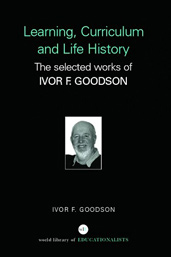Learning, Curriculum and Life Politics: the selected works of Ivor F. Goodson
Nations at Risk
What the Department did to the teacher, it compelled him to do to the child. The teacher who is the slave of another's will, cannot carry out his instructions except by making his pupils the slaves of his own will. The teacher who has been deprived by his superiors of freedom, initiative, and responsibility, cannot carry out his instructions except by depriving his pupils of the same vital qualities. The teacher who, in response to the deadly pressure of a cast-iron system, has become a creature of habit and routine, cannot carry out his instructions except by making his pupils as helpless and as puppet-like as himself.
But it is not only because mechanical obedience is fatal, in the long run, to mental and spiritual growth, that the regulation of elementary or any other grade of education by a uniform syllabus is to be deprecated. It is also because a uniform syllabus is, in the nature of things, a bad syllabus, and because the degree of its badness varies directly with the arc of the sphere of educational activity that comes under its control (Holmes, 1928, pp. 103 – 105).
Holmes provided more details of the working of a system of state prescription of syllabus and control of examinations:
It was preordained, then, that the syllabuses which the Department issued, year by year, in the days of payment by results should have few merits and many defects. Yet even if, by an unimaginable miracle, they had all been educationally sound, the mere fact that all the teachers in England had to work by them would have made them potent agencies for evil. To be in bondage to a syllabus is a misfortune for a teacher, and a misfortune for the school that he teaches. To be in bondage to a syllabus which is binding on all schools alike is of all misfortunes the gravest. Or if there is a graver, it is the fate that befell the teachers of England under the old regime — the fate of being in bondage to a syllabus which was bad both because it had to come down to the level of the least fortunate school and the least capable teacher, and also because it was the outcome of ignorance, inexperience, and bureaucratic self-satisfaction.
Of the evils that are inherent in the examination system as such of its tendency to arrest growth, to deaden life, to paralyse the higher faculties, to externalize what is inward, to materialize what is spiritual, to involve education in an atmosphere of unreality and self-deception I have already spoken at some length. In the days of payment by results various circumstances conspired to raise those evil tendencies to the highest imaginable 'power'. When inspectors ceased to examine (in the stricter sense of the word), they realised what infinite mischief the yearly examination had done. The children, the majority of whom were examined in reading and dictation out of their own reading-books (two or three in number, as the case might be), were drilled in the contents of those books until they knew them almost by heart. In arithmetic they worked abstract sums, in obedience to formal rules, day after day, and month after month; and they were put up to various tricks and dodges which would, it was hoped, enable them to know by what precise rules the various questions on the arithmetic cards were to be answered. They learned a few lines of poetry by heart and committed all the 'meanings and allusions' to memory, with the probable result — so sickening must the process have been — that they hated poetry for the rest of their lives. In geography, history, and grammar they were the victims of unintelligent oral cram, which they were compelled, under pains and penalties, to take in and retain till the examination day was over, their ability to disgorge it on occasion being periodically tested by the teacher. And so with the other subjects. Not a thought was given, except in a small minority of the schools, to the real training of the child, to the fostering of his mental (and other) growth. To get him through the yearly examination by hook or by crook was the one concern of the teacher. As profound distrust of the teacher was the basis of the policy of the Department, so profound distrust of the child was the basis of the policy of the teacher. To leave the child to find out anything for himself, to work out anything for himself, to think out anything for himself, would have been regarded as a proof of incapacity, not to say insanity, on the part of the teacher, and would have led to results which, from the 'percentage' point of view, would probably have been disastrous (Holmes, 1928, pp. 106 – 108).
